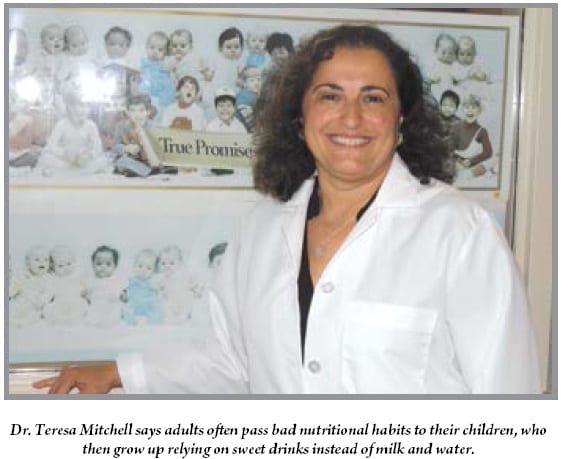Not So Sweet Sugary Drinks Play a Major Role in Obesity, Related Health Problems
Imagine sitting down and eating a bowl filled with 15 to 20 teaspoons of sugar.
According to Dr. Teresa Mitchell, although most people would never do that, they don’t realize they are consuming the same amount of sugar every time they drink a 20-ounce soda.
The excess is not only harmful to health, but its high calorie count can lead to unwanted weight gain. In fact, research has shown that sugary drinks play a major role in the obesity epidemic.
That epidemic — it affects about one in three Americans — was officially classified as a disease last month by the American Medical Assoc., requiring a range of medical interventions to advance treatment and prevention.
And there are some preventive steps anyone can take to decrease their obesity risk and slow the advance of weight-related diseases, from diabetes to cardiovascular issues.
For example, a study done by the Harvard School of Public Health shows that drinking one 12-ounce soda every day causes a weight gain of one pound every four years. “People don’t realize that one soda a day can make a big difference in their lives,” said Mitchell, director of pediatrics at Mercy Family Life Center in Springfield. “But over time it can lead to obesity, which then leads to other chronic diseases.”
Jeff Sautter agrees. “Soda is the most abused and unnecessary form of caloric intake,” said the clinical dietitian from Baystate Medical Center in Springfield. “It should not be used as a hydrating beverage.”
In March, researchers at an American Heart Assoc. conference reported they had found a link between sugary drinks and 180,000 obesity-related deaths worldwide, which included approximately 25,000 adult Americans.
But children also enter into the equation. The Harvard School of Medicine says sugary drinks are the top source of calories in teens’ diets. In addition, a study they conducted found that, for each additional soda a child consumed each day, their odds of becoming obese increased by 60{06cf2b9696b159f874511d23dbc893eb1ac83014175ed30550cfff22781411e5}. Part of the reason is that, even though a 64-ounce cola fountain drink can contain up to 700 calories, adults and children who drink sweetened beverages do not feel as full as if they had eaten the same number of calories from food.
“It’s very easy to consume more calories than you need when you drink sugary beverages because they add up very quickly,” said Michelle Edwards, a clinical dietitian with Baystate Medical Center.
However, weight gain isn’t the only problem related to sugar-filled beverages. People who guzzle one to two cans of soda a day have a 26{06cf2b9696b159f874511d23dbc893eb1ac83014175ed30550cfff22781411e5} greater chance of developing type II diabetes than people who rarely consume these drinks, and a connection exists between sugary drinks, heart attacks, heart disease, and gout.
“The bottom line is that we eat too much sugar and drink too much sugar,” Sautter said, adding that it’s difficult to avoid since 80{06cf2b9696b159f874511d23dbc893eb1ac83014175ed30550cfff22781411e5} of the typical 600,000 items in a grocery store contain added sugar.
But many caring adults unknowingly pass bad habits onto children due to a lack of knowledge. “Some parents give their children more juice than milk,” Mitchell said. “It tastes so good that children naturally want it, and parents offer it because they think it’s healthy. But that’s a misconception. The American Academy of Pediatrics says infants younger than 6 months should not be given any fruit juice because it offers them no nutritional benefits, children 1 to 6 years old should be limited to four to six ounces a day, and children ages 7 to 18 should not have more than eight to 12 ounces a day.”
Still, soda and juice are not the only culprits. Sugary drinks come in many forms, ranging from sports beverages to those touting added vitamins. But drinking a sweetened beverage is no substitute for a healthy diet, and experts say education, including learning how to wean children off sweetened beverages, can make a significant difference in health.
“It’s better to get vitamins from a natural source than a fortified source,” Mitchell said. “Fruit is better than fruit juice because it contains vitamins and fiber.”
Societal Changes
Sautter said fruits and foods that contain natural sugar take time to digest, while the sugar in sweetened drinks goes straight into the bloodstream, which can cause a spike in insulin.
This can be problematic. Edwards said a rise in insulin can increase appetite, cause people to put on more visceral fat, or fat around the abdomen and other organs, and lead to insulin resistance. “There are risks involved with elevated blood sugar over time. It can damage small vessels and also lead to chronic kidney or eye disease,” she told HCN.
Mitchell agrees. “Simple sugar causes a rapid increase in insulin release, which lowers blood sugar and causes a craving for more sugar, which increases caloric intake,” she said. “Sugary drinks can lead to obesity and insulin resistance, which leads to type II diabetes.”
But consumption of sugary drinks has been on the rise for decades. “In the ’70s, sugary drinks made up 4{06cf2b9696b159f874511d23dbc893eb1ac83014175ed30550cfff22781411e5} of the U.S. daily caloric intake. By 2001, it was up to 9{06cf2b9696b159f874511d23dbc893eb1ac83014175ed30550cfff22781411e5}, and between 1989 and 2008, the calories consumed from sugary drinks in children ages 6 to 11 increased by 60{06cf2b9696b159f874511d23dbc893eb1ac83014175ed30550cfff22781411e5},” Mitchell said, adding that youngsters in this age group averaged 209 calories a day from sugary drinks, and the percentage consuming such beverages rose from 79{06cf2b9696b159f874511d23dbc893eb1ac83014175ed30550cfff22781411e5} to 91{06cf2b9696b159f874511d23dbc893eb1ac83014175ed30550cfff22781411e5}.
Edwards tells patients that sugar is addictive. “The more you drink it, the more you are going to want or crave it,” she said.
So, although a small amount of juice — say, four ounces — can be healthy, Edwards suggests parents give children water or low-fat milk instead of fruit juice or drinks containing juice. Another tactic is to dilute juice with more and more water over time. “But the best option is just to keep sugary beverages out of the house,” she said. “When you hydrate with sweet beverages, it’s much easier to consume an excess of calories.”
Mitchell agrees, adding that sports drinks are unnecessary unless someone is engaging in an unusually high level of physical activity. “Water is the best drink. It satisfies thirst, hydrates you, and is all that most children need when they are playing sports.”
The earlier parents reduce their child’s intake of sugary beverages, the better off they will be, she added. “Obesity has been shown to increase the risk of diabetes, and in the last few years, we are beginning to see children as young as 4 with type II diabetes. It’s a disease that used to be seen primarily in obese adults.”
But in order to make good choices, people need to learn to read labels. “There are many names for sugar,” Sautter said, adding that sugar alcohols include sorbitol, manitol, and xylitol. “Some of them are known to cause diarrhea if they are consumed in excessive amounts, and they can also cause bloating and constipation.”
People should also avoid beverages that contain high-fructose corn syrup. “Fructose is rapidly absorbed by the bloodstream. It goes straight into the liver and can trigger an elevation in cholesterol, including triglycerides,” Edwards said.
Although some people switch to diet soda, that can also lead to health problems. “The chemicals in them have been shown to increase the risk of cancer. And soda in general can increase the risk of osteoporosis because it decreases absorption of calcium,” Mitchell said. In addition, people often eat more than they normally would when they choose a low-calorie beverage.
Long-term Benefits
Mitchell says consuming liquid calories does not result in the same satisfaction that comes from eating food, but few people stop to think before they drink.
“Obesity is on the rise, and sugary drinks lead to weight gain without people realizing it,” she noted.
That means maintaining a healthy lifestyle may not be as difficult as some people believe, Sautter said. “Just doing one simple thing — changing what you drink — can be a game changer for your health.”




Comments are closed.